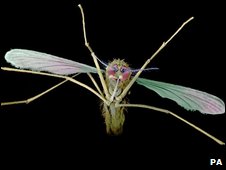Rev. Kishoka
JF-Expert Member
- Mar 7, 2006
- 4,526
- 1,529
Heri ya Mwaka Mpya ndugu na jamaa.
Mwishoni mwa mwaka jana 2008 wakati wa sikukuu ya Thanksgiving, moja wa wageni waliokuja nyumbani kwangu alikuwa ni Mmarekani aliyeniuliza kwa nini Afrika haitumii DDT kupigana na Malaria? Akauliza kama DDT ilitumika huku Marekani na sehemu nyingine duniani na kukawa na manufaa, kwa nini Afrika isitumike ambako uginjwa huu huua karibu watu Milioni Moja kila mwaka?
Sikuwa na jibu sahihi zaidi ya kusema ni ushauri wa mashirika ya kimataifa na woga wa "kuharibu" mazingira kama tutatumia DDT.
Najiuliza, je tumeshawahi kama Taifa kukaa chini na kujiuliza ni vipi vita vyetu dhidi wa maadui wa maendeleo na hasa maradhi tunaweza kuipigana wote kama Taifa ili kuondokana na msingi mmoja unaururudisha nyuma?
Najua tuna TB, Kifua Kikuu, Polio, Ndui, Surua, Kichocho, Pnemounia, Kansa, Ukimwi, na kubwa zaidi ni Malaria.
Je tukiweza kupiga vita Malaria kwa gharama zote na zozote kwa kutumia nguvu zetu zote na njia zote, kuna maafa au ubaya gani ili kupunguza shida hii?
Mwaweza sema aah, hili ni jambo la JF Doctor au Sayansi, lakini naomba tuliangalie kwa mtaji wa kisiasa kwa maana kila kitu Tanzania hususan uhai wetu na maendeleo yetu kama Taifa yanaegemea Siasa.
Jiulize ni nguvu kazi ya namna gani itakayopatikana ikiwa tutaweza kupiga vita na kushinda ugonjwa wa Malaria.
Najiuliza tena, kukataa kwetu kutumia DDT ni suala la kufuata bendera kwa kuwa WHO na UN wametuambia? ni suala la kisiasa au nasi tunauwezo wa kufanya uamuzi huru bila kushinikizwa na kutumia DDT?
Je DDT tukitumia kupigana vita dhidi ya Malaria pekee tunaweza kufanikiwa?
Mwishoni mwa mwaka jana 2008 wakati wa sikukuu ya Thanksgiving, moja wa wageni waliokuja nyumbani kwangu alikuwa ni Mmarekani aliyeniuliza kwa nini Afrika haitumii DDT kupigana na Malaria? Akauliza kama DDT ilitumika huku Marekani na sehemu nyingine duniani na kukawa na manufaa, kwa nini Afrika isitumike ambako uginjwa huu huua karibu watu Milioni Moja kila mwaka?
Sikuwa na jibu sahihi zaidi ya kusema ni ushauri wa mashirika ya kimataifa na woga wa "kuharibu" mazingira kama tutatumia DDT.
Najiuliza, je tumeshawahi kama Taifa kukaa chini na kujiuliza ni vipi vita vyetu dhidi wa maadui wa maendeleo na hasa maradhi tunaweza kuipigana wote kama Taifa ili kuondokana na msingi mmoja unaururudisha nyuma?
Najua tuna TB, Kifua Kikuu, Polio, Ndui, Surua, Kichocho, Pnemounia, Kansa, Ukimwi, na kubwa zaidi ni Malaria.
Je tukiweza kupiga vita Malaria kwa gharama zote na zozote kwa kutumia nguvu zetu zote na njia zote, kuna maafa au ubaya gani ili kupunguza shida hii?
Mwaweza sema aah, hili ni jambo la JF Doctor au Sayansi, lakini naomba tuliangalie kwa mtaji wa kisiasa kwa maana kila kitu Tanzania hususan uhai wetu na maendeleo yetu kama Taifa yanaegemea Siasa.
Jiulize ni nguvu kazi ya namna gani itakayopatikana ikiwa tutaweza kupiga vita na kushinda ugonjwa wa Malaria.
Najiuliza tena, kukataa kwetu kutumia DDT ni suala la kufuata bendera kwa kuwa WHO na UN wametuambia? ni suala la kisiasa au nasi tunauwezo wa kufanya uamuzi huru bila kushinikizwa na kutumia DDT?
Je DDT tukitumia kupigana vita dhidi ya Malaria pekee tunaweza kufanikiwa?

